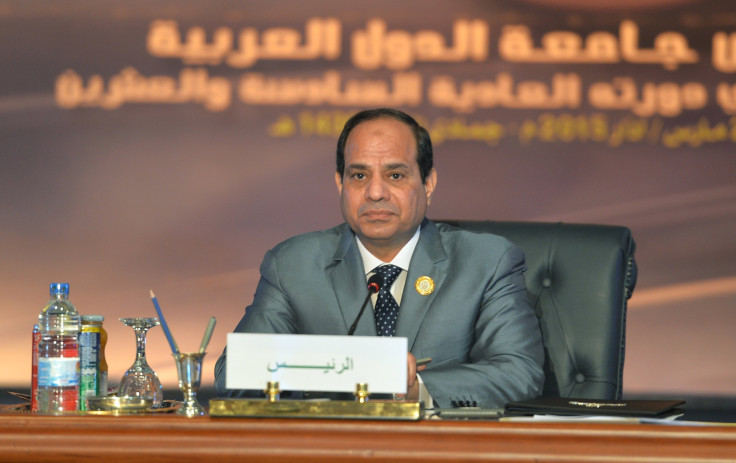Could Egypt President Sisi's Anti-Terror Legislation Prompt Expanded Muslim Brotherhood Crackdown?

Egyptian politicians say new anti-terror legislation is necessary to combat a vicious insurgency in the country’s restive Sinai region. Under the proposed law, individuals found guilty of joining a militant group could face as much as 10 years in prison and those found guilty of financing terror could face life imprisonment.
But the new legislation could also be used to expand a crackdown on the government's opponents, particularly those from the blacklisted Muslim Brotherhood movement as rights activists have long accused the government of shrouding repression of dissent in anti-terror language. The Brotherhood, which has challenged President Abdel Fattah el-Sisi's right to rule, has been labeled a terrorist organization by Sisi's government and has come under intense government pressure in recent months as hundreds of its supporters have been arrested.
The legislation introduced Monday stipulates punishment for those who incite "terrorist acts," including “the use of force, violence, threats, fear” undertaken with the aim of “disturbing public order.” While it is generally agreed Egypt faces a legitimate threat from terrorists operating out of the country's north, rights activists warn such a loose defintion of terrorism could be used to further justify the repression of political opponents.
“Such a wide definition of ‘terrorist act’ has the potential to effectively ban and criminalize the legitimate exercise of human rights, including the rights to freedom of expression, association and peaceful assembly,” an Amnesty International report said last week. “In practice, the authorities and security forces are likely to use the sweeping scope of the legislation to muzzle their political opponents and critics.”
Sisi vowed to bring forth aggressive anti-terror legislation following a car bombing in Cairo last June that killed an Egyptian prosecutor. He initially blamed the attack on the Muslim Brotherhood, but analysts said it was likely the work of Islamist insurgents operating out of the country's Sinai region.
Rights advocates have accused the Egyptian leader of justifying a crackdown on the Brotherhood by blurring the lines between the movement and other Islamist terrorist groups, like the Islamic State-affiliate, Province of Sinai, which has been responsible for hundreds of deaths.
Supporters of the Brotherhood continue to contest Sisi's right to rule following the ousting in 2013 of the democratically elected Brotherhood President Mohammed Morsi, whose government was generally considered a failure for its inability to address economic issues. They have mostly remained nonviolent, despite Sisi's vow to destroy the movement. Thousands have been arrested, tens of thousands of mosques sympathetic to the movement have been closed and books have been banned. Courts have also handed down mass death sentences against Brotherhood members -- many of them in absentia -- as well as to Morsi himself.
#Egypt to approve #anti-terror law; #Brotherhood members arrested for alleged #Suezcanalplot http://t.co/L8F1p0mOWy @EgyptSource @EgyTweets
— Julie Fishman (@fishmanjulie) July 7, 2015Under the guise of countering extremism -- but in a move experts have said is meant to stem the Brotherhood's influence -- Sisi's administration has uniquely commanded control of religious institutions. His government has passed legislation dictating the topics of Friday prayer sermons and has relied heavily on the backing of Egypt's religious authority to crack down on the religion-inspired Brotherhood. Some state-affiliated religious leaders, like world-renowned scholar Ali Gumah, have called for violence against Sisi's opposition.
At the same time, Province of Sinai has claimed the lives of hundreds of Egyptian civilians and security forces. The group was responsible for a string of deadly attacks in July that left dozens of civilians and Egyptian soldiers dead.
The sweeping legislation could see the government yield unprecedented new powers that could be used in the fight ISIS, but also in the fight against the Muslim Brotherhood and other domestic opposition. “This law effectively bans freedom of expression, assembly and association, and can be used to crack down on all kinds of freedom,” Amnesty International’s Egypt researcher Mohamed el-Messiry told AFP.
Amnesty International has suggested the new legislation be revised to protect freedoms by defining "terrorism" more clearly, so as to allow the government to combat legitimate terrorist groups without suppressing citizens' rights. Sisi's government has also faced criticism for its arrest of pro-democracy advocates in recent months.
Despite international criticisms, Sisi has amassed wide support in the country for his ability to establish relative calm in much of the country following years of political and economic unrest. But critics say the new legislation reflects Sisi’s growing consolidation of power framed in anti-terror language, and represents a slide back to Egypt's old style of autocratic rule.
"This is taking us back to the Mubarak era and the 30-year state of emergency that helped push Egyptians to the streets in 2011," el-Messiry said.
© Copyright IBTimes 2024. All rights reserved.





















